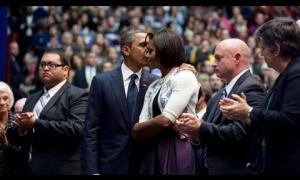Quiz! Who said this, in 1963? (If you saw “Selma,” the answer may surprise you!)
January 07, 2015
"To ask for patience from the Negro is to ask him to give more of what he has already given enough. … The Negro says, 'Now.'"
A controversy over the historical accuracy of the portrayal of LBJ in the new movie Selma is much informed if not exactly put to rest by an anecdote in the Robert Caro’s latest biography volume on Lyndon Johnson, The Passage of Power.
Johnson's consternation at black impatience for voting rights is emphasized in Selma, making MLK the agent of change and LBJ a pure obstructionist. Good morality-play movie. But how true to life?
In 1963, Vice President Johnson was helping make President Kennedy’s case for civil rights legislation, he was invited to make a speech at the 100th anniversary of the Gettysburg Address.
A few days before the Memorial Day weekend, he had [speechwriter Horace] Busby come out to The Elms, and they sat by the swimming pool and talked, with Johnson doing most of the talking, about what should be in the speech. He expected Busby to follow their usual practice and turn his rough views into a polished speech, but this time the speechwriter didn’t think much polishing was required. “I knew what I had heard,” he says. He had been writing speeches for Lyndon Johnson for 15 years, and he felt that this time Johnson had said exactly what he wanted to say. In Busby’s car was a large, clumsy recording device, and, he recalls, as he was driving away from The Elms, “I stopped the car a half a block away and recorded what we’d been saying pretty much as” he remembered it, and the next morning took the recording to his office and had the secretary transcribe it.
To the transcription he added two introductory paragraphs, one at the end, and turned it in to Johnson, who delivered it to great acclaim. Its core:
One hundred years ago, the slave was freed. One hundred years later, the Negro remains in bondage to the color of his skin. The Negro today asks justice. We do not answer him—we do not answer those who lie beneath this soil—when we reply to the Negro by asking, “Patience.” … To ask for patience from the Negro is to ask him to give more of what he has already given enough. … The Negro says, “Now.” Others say, “Never.” The voice of responsible Americans—the voices of those who died here and the great man who spoke here—their voices say, “Together.” There is no other way.
Whatever Johnson actually did and said leading up to the Voting Rights Act of 1965, he did enough in his speech well before the Civil Rights Act to prove he wasn't the befuddled grouch we saw in Selma. —DM


